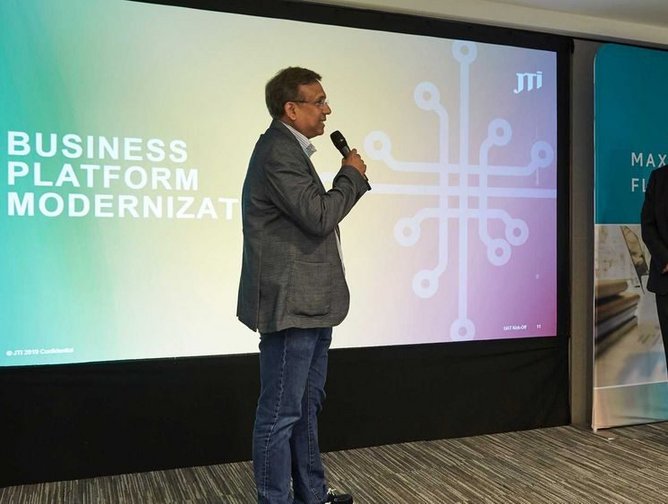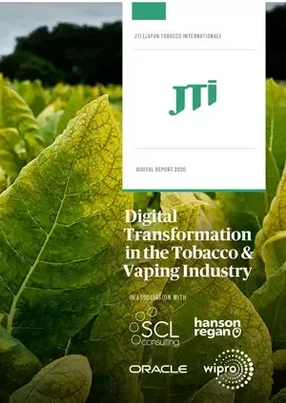JTI: digital transformation in the tobacco & vaping industry
JTI is the world’s third largest tobacco company, operating in close to 100 markets with a workforce of 44,000 people, 29 factories, 8 R&D centers and 6 tobacco processing facilities around the world. The company’s Chief Information Officer is Atiq Samad, and he has been in the role for two years. Such a large, global company has had a head start on the adaptations companies are experiencing worldwide in the face of the ongoing COVID-19 pandemic, as he explains: “Fortunately at JTI, we were already used to having virtual teams, because we are spread out all across the world, representing many different locations. We’ve learned over the last 15, 20 years how to work in a virtual team.”
When Atiq joined JTI, he made it his mission to look at the company’s IT landscape holistically, in order to modernise its technology platforms under the banner of a Business Platform Modernization (BPM) program. “We were one of the first big companies with a single instance database on SAP that moved from ECC to S/4HANA. And this was of course a big technology migration, but not only that, we also did a finance transformation. In terms of our CRM, as part of our trade marketing excellence (TME) program, we decided to go to the latest technologies with Oracle, which is the Oracle Engagement Cloud. We’ve also brought in a single source of truth called One Data, and we‘re looking into the factories and logistics too, to bring them up to the same level.”
It’s not just technology that has changed as part of the BPM initiative, but also the culture. “We are bringing in an investment mindset. So, hand-in-hand with the BPM program, we have implemented what we call the technology investment portfolio management process, where we have a portfolio of all the technology investments. We look at each investment and look at both their initial business benefits and their strategic fit to make a strategic roadmap.”
Part of that strategic roadmap has been embracing emerging technologies. “We’re expanding into artificial intelligence, IoT, robotic process automation. We already have them on a small scale, but now we’re going to expand further into the digital space.”
Future projects coming down the line include getting more out of data with buyer insights and predictive analytics. “We’re looking into the digital space, and how we can leverage IoT for our e-cigarettes, for example. That also opens us up to practice ecommerce - which we can’t with our traditional business.” The transformation goes further into the manufacturing sites themselves. “We are also looking into industry 4.0,” says Samad, “which we already do in terms of manufacturing, operations management and quality sensors. But we want to expand this and really look into transforming our manufacturing and factories. We’re also doing a project now that’s focused on our global supply chain. That’s building the foundation for greater sales forecast and operations planning (S&OP), where we will look at the entire company's sales and operations planning process - but that's for the future.”
JTI’s technological transformation has required the participation of a number of partners such as Hanson Regan and STL. Samad notes that the companies it works with vary in scale. “We have a few big strategic partners, we work with SAP, Microsoft, Oracle, Orange Business Services and Wipro. In addition to that we engage with mid-sized companies that give us more agility and flexibility. Some of these companies started very small and they grew with us, so they feel part of the team spirit that we have created at JTI.”
Thanks to the existing measures put in place by Samad and his team, JTI was well able to weather the coronavirus storm. “We have everything cloud ready - that's why, for example, when we felt the impact of coronavirus, we went from 600 remote workers to about 18,000 remote workers within three days. From an infrastructure standpoint, we had to make an effort, but it didn't create big problems.” Samad further sees the pandemic as opening up possible avenues for potential change. “We’re looking at the digital employee experience, and we're even challenging the concept of the office entirely. Can we not have dynamic offices, for instance? But as the CIO, my biggest focus always has been and always will be on remaining secure, compliant, and resilient.”
That philosophy is aligned with the goals of the business at large. “Our goal is to become the number one tobacco company in the world. In today's world, you cannot do that without technology. I'm excited about it because we can really add value through the technology we introduce.” Samad is clear that the technological work the company has done stands in good stead for the future. “While our competitors are focusing on upgrading their systems and moving to new platforms, we will already be experiencing the value of that technology. That's one thing that really makes us ready for the future.”




